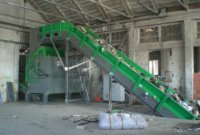Waste-Processing Equipment For Fuel
Refuse Derived Fuel is the common name of alternative fuels derived from waste processing. Almost any organic material, such as pulp, rubber, plastic, leather, substitutes, etc., will be suitable as raw materials. But it is very important that the final material be allowed chlor-containing substances and that there is no " heavy " fraction. The manufacture of liquid fuels and solid fuel pellets, bricks or granules may be possible, but RDF may also be sold in bulk. Petrol uses demand for metallurgical and cement plants, RECs and boilers. Nomus can perform complex engineering under your technical task to recycle TBT into RDF and sell separate units of equipment.
Separation of raw materials for fuel

Environmental issues in fuel production and production are crucial. Separation for disposal and chemically harmful components is the most important stage. Stones, glass and other inert impurities shall not be processed and impeded, and metals, PVCs, chlorines and a number of other substances adversely affect the environment in combustion. Dioxins, phosgenes, cyanides are airborne when fuel composition is not sufficiently filtered. Therefore, RDF fuel production is a complex engineering challenge. Various types of secondary contain:
- The CPD and MDF contain formaldehyde resin;
- Oil paint on objects may contain lead;
- toxic substances are identified in the rotting of organic matter;
- More than a dozen carcinogenic substances are earmarked for the burning of tyres.
Cement, metallurgy and energy are used as a separate fuel. Increased requirements for environmental safety require the provision of high-quality clean-up systems for processing. The cleaning of tyre materials is a multi-stage process, including magnetic separators, drum and vibration coffins, air classifiers, etc.
Related posts:
 In the Volgograd Region Administration, a concession agreement was signed on public utilities, recycling, disposal (storage) of solid household waste. According…
In the Volgograd Region Administration, a concession agreement was signed on public utilities, recycling, disposal (storage) of solid household waste. According… The building is already over, and a bunch of building debris and waste remains lying, rather than seriously ruining the type of capital. As a result, today the required…
The building is already over, and a bunch of building debris and waste remains lying, rather than seriously ruining the type of capital. As a result, today the required… I ve done a lot of franchise monitors, but I ve got the usual bids, a cafe or a store that s already starting to compete with me, I thought I was bored, telling…
I ve done a lot of franchise monitors, but I ve got the usual bids, a cafe or a store that s already starting to compete with me, I thought I was bored, telling… Is discipline important in investing? Without any doubt it is true! A disciplined investor will never buy securities without serious analysis or pay attention to…
Is discipline important in investing? Without any doubt it is true! A disciplined investor will never buy securities without serious analysis or pay attention to… Structural debris: brick, brisket, concrete, stoves obtained during the dismantling of construction sites are transformed into a secondary building block on GOST…
Structural debris: brick, brisket, concrete, stoves obtained during the dismantling of construction sites are transformed into a secondary building block on GOST… Professional presentation demands more than just content - it requires the right display platform. The Black Easel stands out as a sophisticated solution for artists…
Professional presentation demands more than just content - it requires the right display platform. The Black Easel stands out as a sophisticated solution for artists… By 2015, equipped reception and recycling facilities should be established in the five administrative districts of Moscow. They ll be set up by private companies…
By 2015, equipped reception and recycling facilities should be established in the five administrative districts of Moscow. They ll be set up by private companies… The Territorial Waste Management Scheme was held by the Parliamentary Hearings at Medoldum Parliamentary hearings of the Regional Waste Management Scheme were held…
The Territorial Waste Management Scheme was held by the Parliamentary Hearings at Medoldum Parliamentary hearings of the Regional Waste Management Scheme were held… Environmentally sound behaviour is very often consistent with the principles of rationality, servitude, prudential treatment of purchases, by their time, to environmental…
Environmentally sound behaviour is very often consistent with the principles of rationality, servitude, prudential treatment of purchases, by their time, to environmental… Vozim-Gruzim is ready to assist you in addressing this issue not only in the capital of the Republic by providing quality services for the export of solid household…
Vozim-Gruzim is ready to assist you in addressing this issue not only in the capital of the Republic by providing quality services for the export of solid household…